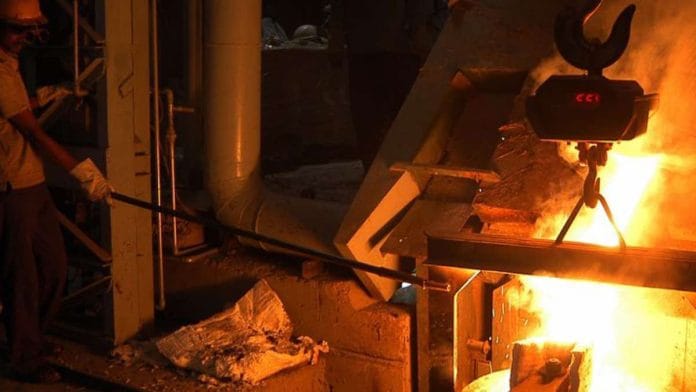New Delhi: The Indian Council for Research on International Economic Relations (ICRIER) Wednesday released a report on an optimal policy strategy for India’s steel-making sector to reduce carbon emissions.
The presentation of the report titled ‘Towards Optimal Pathways for Decarbonising the Indian Steel’ was held at Delhi India Habitat Centre and live streamed on YouTube.
Speaking at the event, Amrita Goldar, senior fellow and thematic lead at ICRIER’s climate change, urbanization, and sustainability division, likened the policy options that India could adopt to “a hand fan”.
“If you unfurl a hand fan, you have a number of possibilities,” she said.
Also present at the event were Nitin Desai, former Under Secretary General at the United Nations, and Sachin Kumar, Director of Industry, Buildings and Cooling Programme, Shakti Sustainable Energy Foundation.
“Steel is an important sector from the growth perspective of India, with demand increasing. So it should also be important to look at it from an emissions perspective,” said Kumar, referring to India’s plan to have an annual steel production of 300 million tonnes by 2030.
The presentation focused on India’s plan to reduce carbon emissions to net zero by 2070, and how the steel industry would factor into this plan.
The ICRIER team presented policy levers for both the demand and supply of steel in India and ways to promote exports. For their report, the researchers focused specifically on steel-producing G20 countries and analysed their policy initiatives.
However, Goldar added, “Grafting revolutionary ideas from other countries is not always the best option. They need to be adapted to the needs of stakeholders in India too. The ICRIER team, she added, had conducted a “policy prioritisation” for the report, for which they consulted stakeholders across India’s steel sector.
The report highlighted the need to reduce blast-furnace based steel production in India, to increase production of green steel (produced using a hydrogen-based method), and for government incentives to encourage adoption of green technology. It also recommended changes to the National Steel Policy to push secondary steel production, which involves collecting steel scraps and processing them for further use.
The report suggested using low-carbon steel for public projects, and encouraging the private sector to invest in green steel.
“But we have to look beyond renewable energy and energy efficiency, and look deeper into the industry to combat climate change,” said Desai.
The ICRIER team’s policy strategies for carbon-neutral steel ranged from technological upgradation to raising awareness of green practices.
The team also addressed a third policy lever for the steel sector — export promotion policies.
To curb “aggressive exports”, the team proposed policies like export tax incentives and preferential credit schemes for exports. Golkar also emphasised the need for foreign policy and trade-related policy interventions in India, the world’s second-largest producer of crude steel.
“The idea is to have an expansive green policy that takes into account every step in the steel production and supply chain. The globe is connected through the steel value chain, and a ripple in one country is felt all across,” said Golkar. “Climate change imperatives are not India’s alone, they are global challenges.”
(Edited by Zinnia Ray Chaudhuri)
Also read: Marble, glass, steel: Indian architects caught between desires of cash-rich & climate alarm






